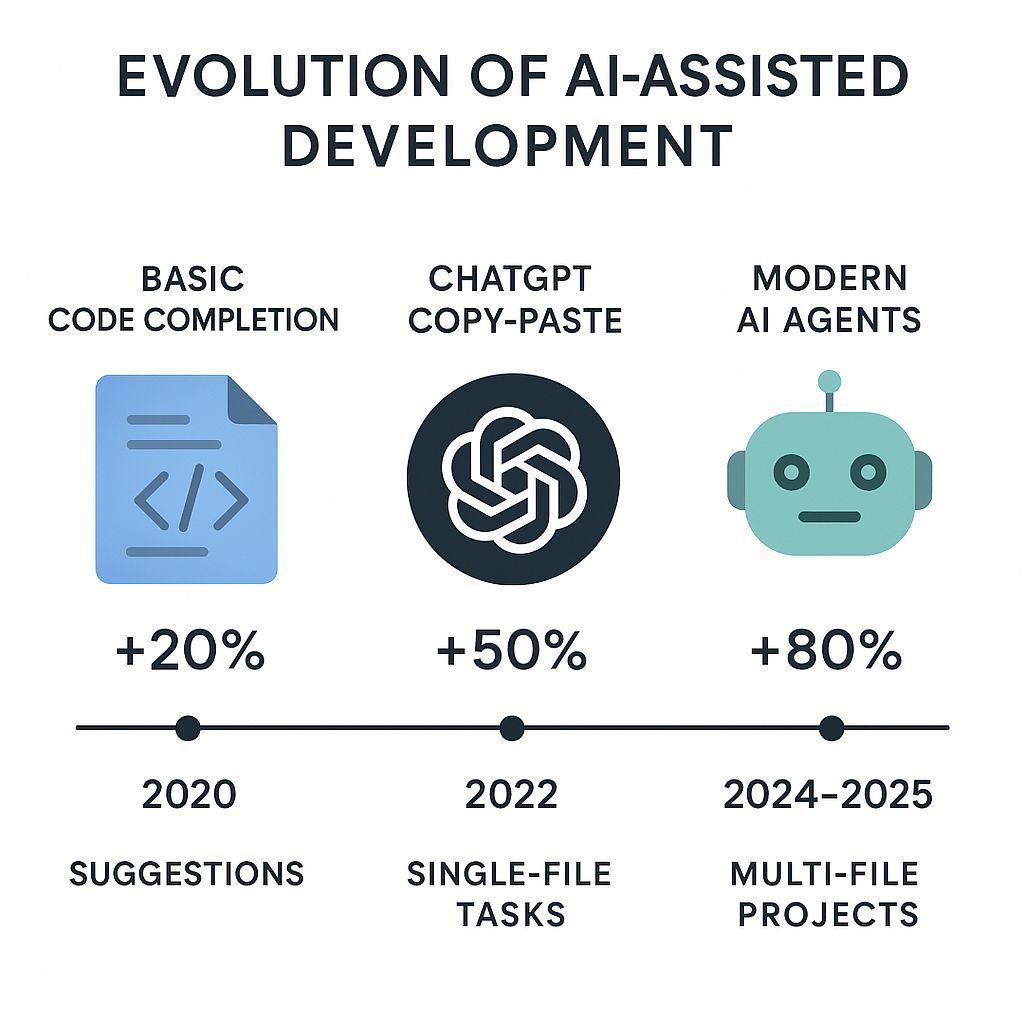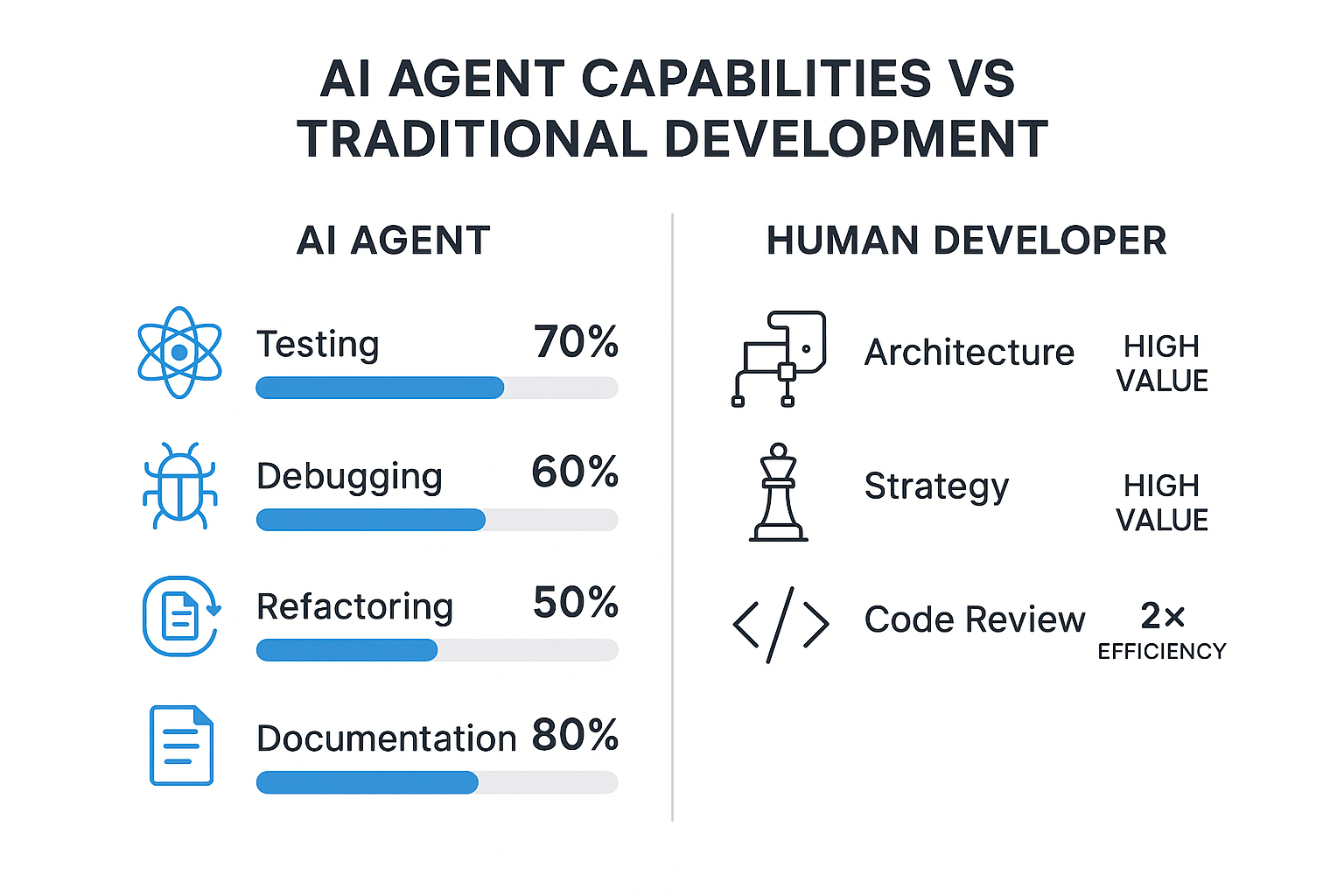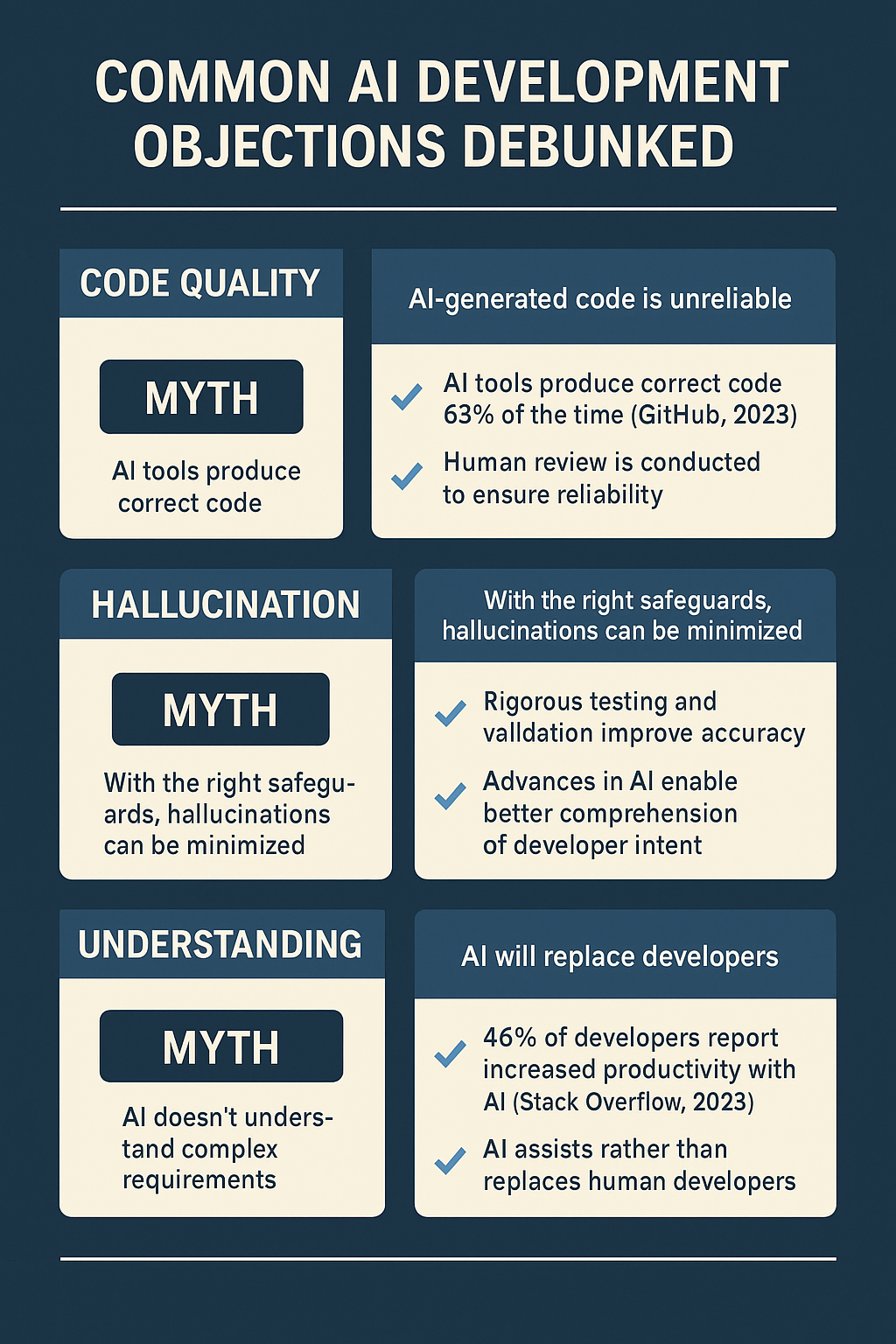The tech world is buzzing with AI debates, but here's what's shocking: some of the brightest minds in software development are completely dismissing artificial intelligence as just another passing trend.
While executives push for AI adoption and developers resist, there's a massive gap between perception and reality that's costing the industry valuable productivity gains.
If you're still copying code snippets from ChatGPT into your editor, you're missing the real revolution happening right now.
The help of AI agents in modern development workflows is transforming how we build software, and the skeptics are about to be left behind.
The Current State of AI-Powered Development
Beyond Simple Code Generation
Today's AI-powered development isn't about basic code completion or simple ChatGPT queries. Modern developers leverage sophisticated AI agents that:
- Navigate entire codebases autonomously
- Execute commands and run development tools
- Compile, test, and iterate on code independently
- Integrate with version control systems like Git
- Perform complex debugging and analysis tasks
These aren't just glorified autocomplete features "“ they're comprehensive development partners that handle the mundane aspects of programming while developers focus on architecture and strategic decisions.
The Integration Revolution

The most effective AI implementations in development today use agent-based approaches. These systems can pull context from multiple sources, run standard Unix tools, interact with linters and formatters, and even make custom tool calls through protocols like MCP (Model Context Protocol).
The underlying technology driving these agents isn't mysterious AI magic "“ it's solid systems programming that connects language models to real development workflows. A skilled developer could build an effective coding agent in a weekend, with success depending more on understanding build systems and testing frameworks than on cutting-edge AI research.
Breaking Down the Common Objections
"I Don't Understand What the Code Does"
This argument reveals a fundamental misunderstanding of professional development responsibilities. Every developer has always been accountable for code that reaches production, regardless of its origin. Whether you're reviewing a colleague's pull request or AI-generated code, the principle remains the same: read, understand, and validate before merging.

AI-generated code isn't "probabilistic" or unknowable "“ it's simply code that requires the same scrutiny you'd apply to any external contribution. If you can't read and comprehend the repetitive, structured code that AI produces, how do you handle the complex, deadline-driven code that human developers create?
"Hallucination Makes AI Unreliable"
This concern, while valid in some contexts, is largely solved in modern development environments. AI agents compile code, run tests, and lint automatically. When an AI invents a non-existent function or API, the development environment catches the error immediately, and the AI corrects itself.
The hallucination problem that plagued early AI coding tools has been effectively mitigated by proper tooling and testing integration. Modern AI agents fail fast and recover quickly, making hallucination a minor inconvenience rather than a blocking issue.
"The Code Quality Is Poor"
Here's a reality check: does a junior developer cost $20 per month? Because that's the price point for professional AI coding tools like Cursor.ai.
Managing AI code quality is fundamentally the same skill as managing junior developer output "“ it requires guidance, code review, and iterative improvement. The difference is that AI doesn't get tired, doesn't have bad days, and can work on tedious tasks without losing focus or motivation.
Moreover, AI agents often produce more thorough code than human first attempts. While human code might be more stylistically elegant, AI code tends to be more comprehensive in error handling and edge case coverage.
The Practical Benefits: Why AI Agents Matter
Eliminating Development Friction
The help of AI agents shines brightest in removing the barriers that prevent developers from starting new projects. Instead of spending hours on boilerplate setup, dependency management, and configuration, AI can handle these tedious tasks automatically.
This shift is particularly valuable for experimental projects and rapid prototyping. AI agents can get you from idea to working prototype faster than ever before, dropping you directly into that productive flow state where you're tweaking working code rather than fighting with setup issues.
Handling the Unglamorous Work
Every codebase contains mountains of repetitive, necessary-but-boring work: unit test maintenance, documentation updates, refactoring legacy code, and dependency updates. AI agents excel at these tasks, freeing human developers to focus on architectural decisions and creative problem-solving.
When an AI agent can spend hours in a virtual machine refactoring your test suite and return with a clean pull request, it forces you to confront whether you're using your time effectively or just avoiding more challenging work.
Expanding Technical Capabilities
AI agents often have broader algorithmic knowledge than individual developers. They can implement complex algorithms, data structures, and mathematical concepts without the research phase that human developers typically require.
This doesn't replace human expertise "“ it augments it. A developer can focus on system design and business logic while the AI handles implementation details for algorithms they might not use frequently enough to memorize.
Addressing the Industry Concerns

The "Craft" Argument
Professional software development isn't artisanal woodworking. While there's satisfaction in elegant code, the primary goal is solving real problems for real users. If you need a table for your office, you buy a table "“ you don't hand-carve one from scratch.
The same principle applies to software. When deadlines matter and users need features, spending extra time on code aesthetics that no one will see or appreciate is often misplaced effort.
Job Displacement Fears
Software development has always been about automating other industries' manual processes. The irony of developers fearing job automation isn't lost on anyone who's watched our field eliminate entire categories of work over the past few decades.
Will AI change the software development job market? Absolutely. Will it eliminate programming jobs entirely? Probably not, but it will certainly change what those jobs look like. The developers who adapt to working alongside AI will have significant advantages over those who resist.
The Path Forward
Embracing Asynchronous Development
The most advanced AI-assisted developers today use asynchronous workflows. They start their day by assigning multiple tasks to AI agents, handle other responsibilities, and return to review completed work. This approach can result in multiple pull requests ready for review in the time it would take to complete one task manually.
Building Better Tooling
The future of AI-assisted development lies in better integration with existing development workflows. This means improved toolchains, better context management, and more sophisticated agent capabilities that understand project-specific requirements and coding standards.
Conclusion: The Reality Check
The debate around AI in software development has moved beyond philosophical discussions. Real developers are using these tools to ship better software faster. The productivity gains are measurable, the use cases are expanding, and the technology continues improving rapidly.
While skepticism about AI hype is healthy, dismissing the practical benefits of AI agents in development workflows is counterproductive. The developers who learn to work effectively with AI today will have significant competitive advantages tomorrow.
Ready to explore AI-powered development? Start small "“ try an AI coding assistant for a week on a non-critical project. Focus on learning how to give effective prompts and integrate AI feedback into your review process. The future of software development is collaborative, and AI agents are becoming essential team members.
The question isn't whether AI will impact software development "“ it already has. The question is whether you'll be leading that change or catching up to it.
